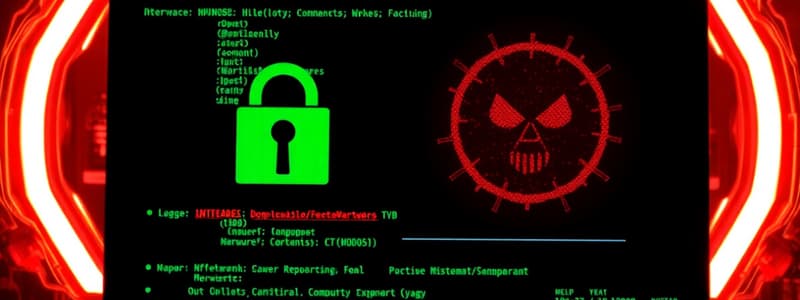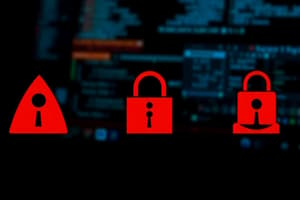Podcast
Questions and Answers
Which type of hacker operates with permission and aims to improve security?
Which type of hacker operates with permission and aims to improve security?
- Black Hat Hacker
- White Hat Hacker (correct)
- Gray Hat Hacker
- Red Hat Hacker
Antivirus software is designed to enhance computer performance.
Antivirus software is designed to enhance computer performance.
False (B)
What is one reason why computer protection is crucial?
What is one reason why computer protection is crucial?
It protects personal information.
A hard disk drive (HDD) uses __________ disks to read and write data.
A hard disk drive (HDD) uses __________ disks to read and write data.
Match the following types of computer storage with their characteristics:
Match the following types of computer storage with their characteristics:
Which of the following is NOT a type of malware?
Which of the following is NOT a type of malware?
A Trojan is a type of virus that can replicate itself.
A Trojan is a type of virus that can replicate itself.
What is one common sign that a computer might have a virus?
What is one common sign that a computer might have a virus?
______ is a method through which viruses can spread from one computer to another.
______ is a method through which viruses can spread from one computer to another.
Match the following types of malware with their characteristics:
Match the following types of malware with their characteristics:
Flashcards
White Hat Hacker
White Hat Hacker
An ethical hacker who uses their skills to find vulnerabilities in systems for the purpose of improving security. They work to protect systems and data.
Black Hat Hacker
Black Hat Hacker
A malicious hacker who uses their skills for illegal activities, such as stealing data, disrupting systems, or causing damage.
What does antivirus do?
What does antivirus do?
An antivirus program scans your computer for malicious software (malware) such as viruses, worms, and Trojans, and removes or quarantines them to protect your data and system.
Hard Disk Drive
Hard Disk Drive
Signup and view all the flashcards
Cloud Storage
Cloud Storage
Signup and view all the flashcards
Malware is
Malware is
Signup and view all the flashcards
What are the types of malware?
What are the types of malware?
Signup and view all the flashcards
How do viruses spread?
How do viruses spread?
Signup and view all the flashcards
What are the signs of a virus?
What are the signs of a virus?
Signup and view all the flashcards
What is computer protection?
What is computer protection?
Signup and view all the flashcards
Study Notes
Malware & Malware Types
- Malware is software designed to disrupt a computer
- Malware aims to cause damage, steal information, gain unauthorized access, or disrupt normal computer operations
- Malware types include viruses, Trojans, and spyware
Types of Malware
- Viruses: Programs that replicate and spread to other computers
- Trojans: Disguised as legitimate software, but harmful once executed
- Spyware: Secretly monitors and collects user data
How Viruses Spread
- Email attachments
- Downloads
- External drives
- Network sharing
- Malicious websites
Signs of a Virus
- Slow performance
- Frequent crashes
- Unusual behavior
- Missing files
- Unfamiliar programs
Protecting Your Computer
- Install antivirus software and perform regular updates
- Create strong passwords
- Be cautious with email links
- Avoid inserting untrusted USBs into your computer
- Always check your computer's built-in protection, e.g. Windows Defender
What is Antivirus?
- Antivirus is software designed to detect and remove malware.
Popular Antivirus Software Options
- Norton Antivirus
- Avast Free Antivirus
- (Others, listed in the slides)
Computer Protection Importance
- Protects personal information
- Prevents data loss
- Ensures smooth performance
- Stops spread to other devices
Types of Hackers
- White hat hackers
- Black hat hackers
Hacker Purposes
- Leak private information
- Gain unauthorized access to information
- Interfere with computer security and privacy
Computer Storage
- A storage device is hardware used to store, transfer and extract files/objects temporarily or permanently
- Types of Storage: Compact Disc (CD), Flash Drive, Memory Cards, Hard Disk Drive, Cloud Storage, Solid-State Drive (SSD)
Types of Computer Storage-Example: HDD
- Hard Disk Drive (HDD): traditional storage device using spinning disks to read and write data
- HDD is commonly used in computers and laptops
- HDD stores information magnetically on spinning disks, allowing for quick data access
Types of Computer Storage-Example: SSD
- Solid-State Drive (SSD): newer storage type using flash memory. More efficient than HDDs
- Commonly used in newer laptops and desktops
- SSDs are faster than HDDs due to the lack of moving parts enabling instant data access
Types of Computer Storage -Example: USB Flash Drive
- USB Flash Drive: a portable device used to store files.
- Useful for transferring files between computers and for backup purposes
- Uses flash memory for easy portability.
Measuring Memory
- The base units of memory are bit, byte (8 bits), kilobyte (1024 bytes), megabyte (1024 KB), gigabyte (1024 MB), and terabyte (1024 GB)
Additional Storage Concepts
- Memory cards
- Cloud storage
- Optical discs
Studying That Suits You
Use AI to generate personalized quizzes and flashcards to suit your learning preferences.
Related Documents
Description
This quiz explores the various types of malware, their functions, and the methods by which they spread. Learn how to identify signs of infection and protect your computer from these malicious programs. Test your knowledge on viruses, Trojans, spyware, and antivirus solutions.



